-
Egrant almost ended up owned by a Brazilian, which strongly indicates that disgraced former EU Commissioner John Dalli’s alleged statement to Jonathan Ferris, that the name ‘Egrant’ was specifically chosen and stood for “Electoral Grant”, was a red herring.
-
Egrant was purchased by Brian Tonna together with the companies transferred to Keith Schembri and Konrad Mizzi. But internal Mossack Fonseca emails reveal that Tonna was not necessarily the intended owner, despite his claims.
-
Mossack Fonseca’s system had no record of Egrant’s Ultimate Beneficial Owner and its billing system had no record of interactions on Egrant between August 2013 until October 2016.
-
Egrant was dissolved on 6 April 2017, following press revelations on the Panama Papers. Joseph Muscat called an election soon after, on 1 May.
-
By the time Daphne Caruana Galizia had reported on Egrant, Nexia BT had nine months to get their records straight and in line with the government narrative. But when it came to distancing Michelle Muscat from Egrant, Nexia BT faced difficulties with Mossack Fonseca.
The International Consortium of Investigative Journalists (ICIJ) lifted the lid on a secretive industry, offshore companies, through a massive data leak by a Mossack Fonseca whistleblower known as Panama Papers in early 2016. A year later, there was a second leak colloquially known as ‘Panama Papers 2’.
In this second leak, journalists were able to get some insight into the panic within Mossack Fonseca as it faced inevitable implosion and tried to clean up its database of thousands of shady companies.
One of those companies was the infamous Egrant Inc.
Easter lamb in Panama
On 18 April 2016 – two weeks after the Panama Papers had broken and three weeks after Daphne Caruana Galizia’s cryptic Easter Lamb post hinting at the shocking revelations to follow – Joseph Muscat’s government voted along Party lines to defeat a motion of no confidence presented by the Opposition.
Following a marathon 13-hour parliamentary session, the motion was defeated by 38 votes to 31, and through a counter-motion, the Labour Party shamelessly reversed it into a vote of confidence.
Simultaneously, 9,921km away, in Panama City, Cesar Mina, a Data Entry Specialist from Mossack Fonseca’s (MossFon) Companies Production unit, was working frantically to clean up the company’s database of clients.
This was part of the immediate fallout of the Panama Papers as regulators pounced on MossFon for information on clients and the company was in no position to provide clear answers.
At 5.29pm Panama time, an exhausted Cesar emailed his team with a quick status update noting that the next step would be to “clean out” those companies without an identified beneficial owner but with shareholders that are individuals, and “clean the bearer shares”.
The following day, Cesar sent his team two updated spreadsheets with details of MossFon administered companies.
Under the list of thousands of active Panama companies established by MossFon without any information on the ultimate beneficial owner (UBO) on file, a familiar name crops up – Egrant.

Other familiar names pop up in another section of the spreadsheet: Tillgate Inc (owned by Muscat’s former chief of staff Keith Schembri) and Hearnville Inc (owned by former Energy Minister Konrad Mizzi).
However, given the well-publicised flurry of activity in 2015 through MossFon’s services, including transfers to New Zealand Trusts and attempts to open bank accounts, Hearnville and Tillgate did have all relevant UBO details completed including addresses and passports on file (and much more):

On 22 April 2016, while Daphne Caruana Galizia was emailing a journalist abroad to keep an eye out for “Mackbridge Ltd” (sic) and “17 Black Ltd” in the ICIJ data leak, MossFon received a dreaded letter. It was from the Panama equivalent of the Maltese FIAU, the Unidad de Análisis Financiero (UAF), asking the million dollar question: Who owns Egrant?
Perhaps unaware of the implications of such a reply, it seems that MossFon went out on a limb. On 29 April 2016, MossFon replied:
“We are writing to you on this occasion to respond to your Note No. UAF-CCNI-147-16, dated 22 of April, 2016, by means of which we are requested information on the Panamanian corporation Egrant Inc. In this sense, we will proceed to respond to the points detailed in your note, based on the information in our files:
- That Mr Brian Tonna is the final beneficiary of the company Egrant Inc.
- That the entirety of the shares of Egrant Inc is issued in favour of ATC Administrators Inc.
- That ATC Administrators Inc is a member of the group of companies used by Bufete MF & CO for the provision of secretarial services.”
Until that date, MossFon’s internal records on Egrant’s owner were far less categorical.

So how did MossFon arrive at the conclusion that Brian Tonna was the UBO of Egrant?
Egrant is born
Establishing a company in Panama is, on paper, a laborious process. Lawyers need to draft a long deed, physically visit (and pay) a notary to publish the deed, make multiple payments to government authorities, and file the published deed and confirmations of payments with the public registry.
To avoid this, a practice developed over the years to set up ‘shelf companies’. This practice was adopted in Panama as well as other offshore jurisdictions such as The British Virgin Islands, Seychelles or Belize.
This practice involves establishing a large number of companies in advance with boilerplate documentation and using random names, leaving them dormant or “on the shelf”, ready to be transferred to a client needing an anonymous company.
MossFon also offered a more bespoke service, where a client could (for an additional cost) choose the name or tailor the documentation. Egrant was not one of them.
On 12 July 2013, MossFon’s menu of available shelf companies was:
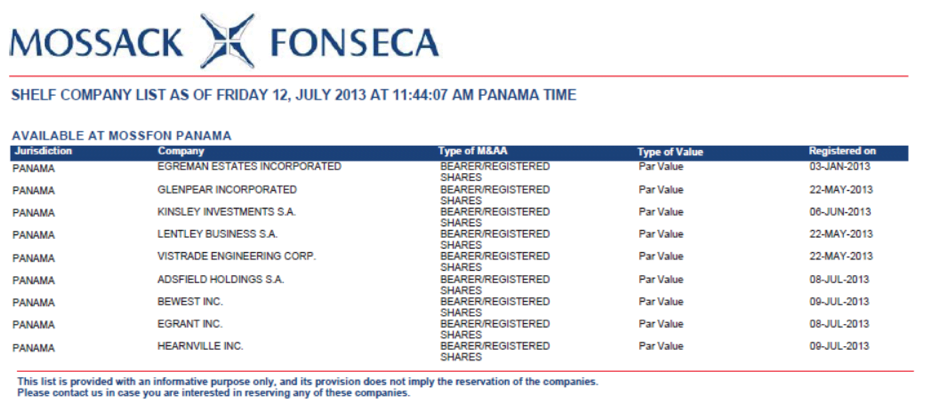
Internal MossFon emails show that both Egrant and Hearnville were offered (using the list above) as available for a Brazilian client. The Brazilian law firm would go on to purchase Bewest Inc – just one up from Egrant on the list.
The fact that Egrant almost ended up owned by a Brazilian, strongly indicates that disgraced former EU Commissioner John Dalli’s alleged statement to Jonathan Ferris, that the name Egrant was specifically chosen and stood for “Electoral Grant”, was a red herring.
Three days later, another company was added to MossFon’s ‘menu’ of shelf companies available for purchase by clients – Tillgate.
After months of on-off discussions with Luis Quiel, a US-based MossFon lawyer, about how New Zealand’s secretive Trust regime worked well as a holding vehicle for already secretive Panama companies, Karl Cini from Nexia placed an order on 19 July 2013 for three Panama shelf companies.
Cini received an automated email from MossFon confirming that three companies had been reserved for him until 26 July 2013: Tillgate, Hearnville and Egrant.
Although based on earlier correspondence it is evident that Nexia was acquiring these companies for identified clients – a conclusion also reached by the forensic expert in the Egrant inquiry, the Order Forms for each of these companies was completed indicating Brian Tonna as their initial shareholder, behind a nominee to be provided by MossFon.
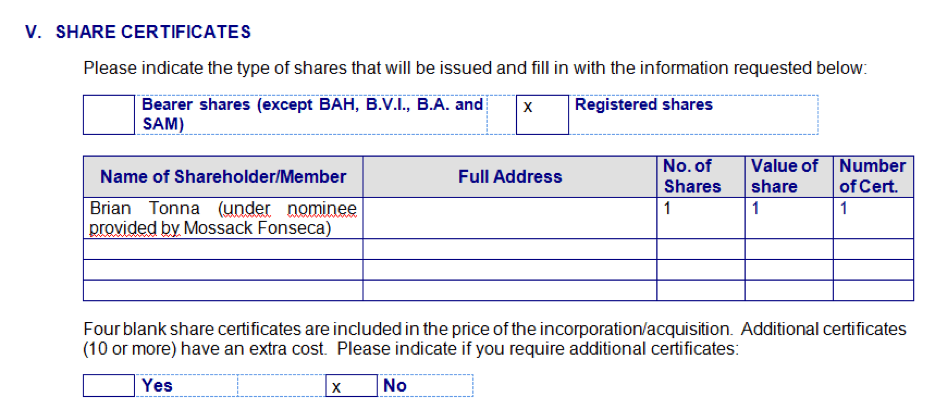
A factory of anonymous companies
It is no exaggeration to call MossFon a factory of anonymous companies. For the bargain price of $1,600 (or a fraction of that, if purchased by a MossFon representative office such as Nexia), MossFon would hand you the keys to a pre-prepared company. All clients had to do was fill in an Order Form with some very basic details.
In return, the client received a pack of documents showing that the company was set up and who the directors and functionaries were – all MossFon’s own staff. The shareholders, on paper, would be MossFon entities.
The client would also receive a signed slip of paper saying that, irrespective of what the documents state, the client was the owner and the shareholders would deliver on any client request. The client would also receive a bearer share certificate and a signed confirmation that the shelf company had never traded before.
Having an anonymous company is useless unless you can control it, so MossFon’s nominee directors would, upon request, also sign a general power of attorney effectively signing away their directors’ powers, including to issue or cancel shares, to whoever the client wished.
Another service offered by MossFon, in case a sweeping power of attorney left too much of a paper trail, was for the MossFon directors to sign any documents (even backdated) upon request, for an additional fee.
In order to make clients’ lives easier, MossFon also included four blank but signed share certificates in the price (and more for a fee) so that the buyer could print out new share certificates as the anonymous company bounced around from owner to owner.
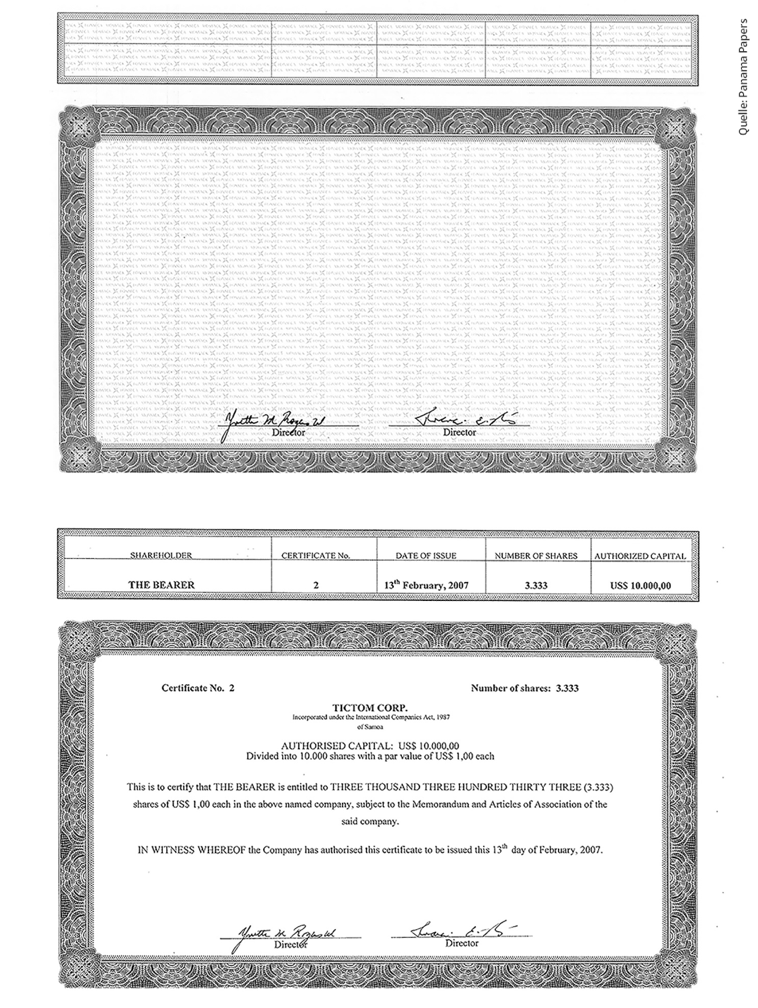
On 9 August 2013, MossFon sent Karl Cini the incorporation pack for Egrant, Hearnville and Tillgate. The following week, MossFon sent him a power of attorney, effectively granting him and Brian Tonna the keys to Egrant.
Although MossFon had the company set up and billing process down to a tee, compliance with basic anti-money laundering rules was not an area in which MossFon excelled.
The clean up continues
On 21 May 2016, Cesar Mina sent an update to his colleagues on the process of cleaning up MossFon’s client database noting that they were still unable to identify a shocking 74% of their Panama companies’ owners.
In a follow up email that same day, Cesar attached an updated spreadsheet. This time, Egrant, along with a handful of other companies (around 1.5%) had been moved to the list of companies with some UBO info (at least a name):

Faced with having 74% of their Panama companies without the owners known to them, MossFon defaulted to using the details in the original Order Form as the UBO – irrespective of whether this was a lawyer or accountant evidently acting for third parties.
With no further details on the UBO of Egrant in its files, MossFon used the details that it had on the Egrant Order Form back in 2013, listing Brian Tonna.
These same details were also included for Tillgate and Hearnville before these were eventually transferred to their real UBOs in 2015 in order to vest them in their New Zealand Trusts.
Interestingly, Egrant was tagged in that spreadsheet as having last seen activity (“Fecha Ultimo Caso” or “Last Matter Date”) involving MossFon of 15 August 2013. That is when Karl Cini asked for the power of attorney.
By contrast, Tillgate and Hearnville were tagged as having a last MossFon matter date in September 2015, around which date Cini was still emailing to try to open bank accounts for Keith Schembri’s Tillgate and Konrad Mizzi’s Hearnville. These attempts continued until June 2016, according to the forensic expert in the Egrant inquiry.
This would indicate that, at least insofar as MossFon was concerned, it had not heard anything further from Nexia about Egrant since MossFon handed them the keys in 2013. If MossFon had, it would have logged it as a “new matter” and later billed for it.

At around the same time, in late May 2016, Nexia started distancing itself from MossFon’s Malta operations (Mossack Fonseca & Co. (Malta) Ltd).
A month later, MossFon started the process to revoke Brian Tonna and Karl Cini’s general powers of attorney issued by 12 of the companies administered by Nexia with a MossFon nominee, including Egrant, Tillgate (Keith Schembri), Hearnville (Konrad Mizzi), Selson Holding Corp (Malcolm Scerri, a Schembri employee), Blue Sea Portfolio Ltd (Pierre Sladden), Colson Services Ltd (Keith Schembri), Lester Holdings Group Ltd (Adrian Hillman), and Torbridge Services (Cheng Chen).
The Maltese FIAU was at the time investigating and carrying out visits at Pilatus Bank – only to be ignored.
Between these investigations, open speculation in the media and the impending visit by the EU Parliament’s PANA Committee, Tonna seems to have felt the need to get his story straight on Egrant.
The Egrant inquiry shows that starting in the summer of 2016, Tonna worked on what he called a “final script” on Egrant with input from lawyers Henri Mizzi and OPM lawyer Alex Sciberras.
The wind down
In October 2016, Karl Cini emailed Christian Fermin from MossFon saying some other clients wished to have their companies struck off, specifically mentioning Egrant.
Even though at this point MossFon’s accounts with its long term bankers had been frozen or closed, MossFon’s first thoughts appear to have been about fees. By January 2017, Nexia also wanted to liquidate Tillgate and Hearnville but MossFon would not budge.
Leida De León from MossFon told Cini that several fees, including $3,000 for Egrant to “reactivate it”, needed to be settled before proceeding with the dissolution of these companies.
After haggling over the price, Cini confirmed that he had wired $4,191.70 from Nexia’s BOV account to an account indicated by MossFon with Noor Bank in the United Arab Emirates (UAE), in the name of Starsight Trading Limited, a UAE company.
MossFon was forced to resort to using an anonymous company, this time in the UAE, to continue banking while banks turned their backs on MossFon. On 7 February 2017, De León confirmed receipt of the fees.
Billing was not the only thing on beleaguered MossFon’s mind. The company also took the opportunity of a client wishing to liquidate companies to collect some further details on UBOs. De León sent Cini a blank template proxy form telling him that this form needed to be filled in and signed by the beneficial owner of each company in order to dissolve the company.
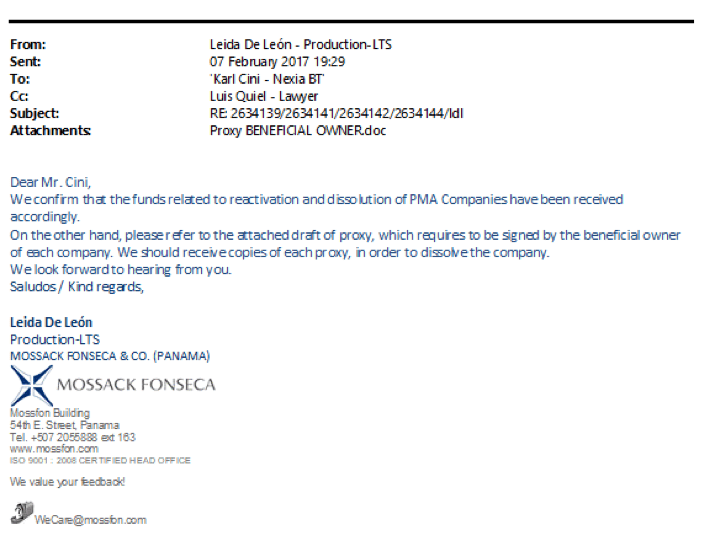
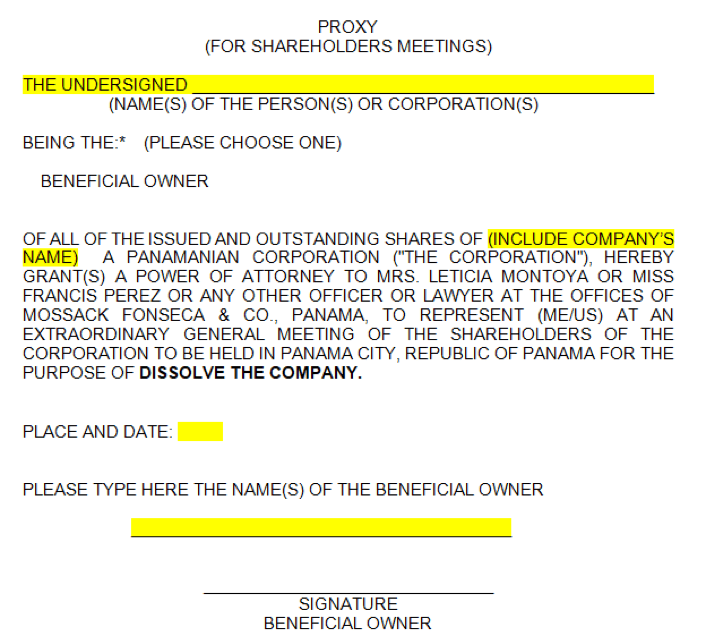
Prior to that, according to other proxies seen by the Shift, MossFon would simply ask for the “holder” rather than the UBO. This time MossFon only included one option: ‘Beneficial Owner’.
Cini went on to complete these proxies filling in Brian Tonna’s name for Egrant, Keith Schembri’s name for Tillgate and Konrad Mizzi’s name for Hearnville and went about collecting their signatures.
Tonna would later use this document filled in by Cini and signed by himself as further “evidence” for Maltese media and then-Magistrate Aaron Bugeja that he was the UBO of Egrant.
These were not the only documents generated by Cini to “evidence” that Egrant was owned by Tonna.
Between 30 January and 24 February 2017, Cini drafted two letters purportedly coming from Riccardo Samaniego from MossFon, according to the forensic expert in the Egrant inquiry.
Even though MossFon’s founders and senior staff were being rounded up by Panamanian police, MossFon again took this opportunity to backfill their missing due diligence. Eilyn Reluz from MossFon’s rapidly dwindling corporate team told Cini that “in order to sign this document due diligence information [on Egrant] must be completed”.
Cini’s reply on 3 March 2017 was curt: “I believe that the matter has been now sorted already (sic). The company never traded and any documentation is held at our office address below”.
Between haggles over fees due by Nexia for these companies and MossFon’s own internal banking troubles, it took until 6 April 2017 for Egrant to be finally dissolved.
When slain journalist Daphne Caruana Galizia wrote that “by yet another series of serendipitous flukes, this website has discovered who owns the third company in Panama, Egrant Inc” on 15 April 2017, the company had already ceased to exist by over a week.
By that time, Nexia had been working on ensuring the story on Egrant was watertight for nine long months with input from several lawyers. Joseph Muscat announced snap elections soon after, on 1 May.
On 17 April 2017, MossFon confirmed that Tillgate and Hearnville had also been dissolved. In order to send Cini copies of the dissolution documents, MossFon’s Olga Londoño asked for their UBO’s “ID / Passport and proof of address” for Keith Schembri and Konrad Mizzi.
Nexia’s efforts to get forms to fit government line on Egrant
With Egrant now firmly in the spotlight following Caruana Galizia’s report that it belonged to Michelle Muscat, the wife of the prime minister at the time, Cini became increasingly frantic.
On 26 April, 2017, Cini wrote to Leida De León, “We need an official statement from Jacqueline Alexander on behalf of Dubro Limited S.A. and Aliator S.A. confirming, after doing your own internal checks, that no declaration of trust has been issued and/or signed by her dated 20 August 2015 on behalf of the mentioned entities Dubro Limited S.A. and Aliator S.A. saying that these entities hold a share each in the Panamanian corporation Egrant Inc (now dissolved) on behalf of Ms Michelle Muscat. Two declarations should be issued, one for each entity under the letterhead of each entity.”
A day later, Cini wrote back to De León, “[I also] need a declaration by the directors who signed the resolution for the dissolution to confirm who at the time of the dissolution was the beneficial owner of Egrant inc. An additional document would be required in the form of a duly stamped share register confirming that ATC Administrators Inc were still the shareholders at the time the company was put into liquidation… I need them quite urgently”.
After five unanswered chaser emails, Cini finally got a reply. De León had joined the mass exodus from MossFon and someone else had to be assigned.
On 2 May 2017, Panama’s anti-money laundering agency UAF again wrote to MossFon asking for details on the owner of Egrant. MossFon, this time with more documents supplied by Cini and Tonna on file, confirmed that Brian Tonna was Egrant’s UBO, according to their records.
It would take until 16 May 2017 for someone to properly acknowledge Cini’s emails. Separately Cini asked for originals of the letters he himself drafted in February. After some questions implying that MossFon had no internal record of having signed them, MossFon’s accountant Samaniego signed them again backdated to February. The charge for these two signatures was $577.80.
Cini chased the reply, two days after his original message: “I really need those documents urgently…”.
Yet another chaser the next day: “Do you think I can have a scan of the documents today? Are they ready ?” Cini wrote.
Mirzella Tuñón from MossFon’s legal team finally replied. “Dear Mr Cini, I am currently awaiting the approval from the lawyer to the draft prepared…. However, we are pleased to confirm how the [bearer shares] work in a [Panama] company… in the practice, the subscribers do not become shareholders because through the written document, the subscribers waive any rights they may have to the shares and assign them to the client”.
Cini was not amused. “Yes, I understand how the subscriber shares work… I also have a copy of the waiver documents… It is however important that the various declarations that I have requested state (in your own word[s]) exactly what I have requested to make things unequivocally clear”.
Internally within MossFon a discussion started regarding Cini’s declarations on Egrant and Michelle Muscat, as well as the fee they would charge.
On the declaration confirming that Brian Tonna was the UBO until dissolution, MossFon looked at the Order Form in 2013 and the dissolution proxy signed by Tonna in January as UBO and noted that “as long as it matches what we told UAF” and “we limit ourselves to the date of dissolution”, it should be fine.
The declaration about Michelle Muscat and Trusts was more problematic.
Josette Roquebert, a lawyer within MossFon’s legal team was adamant: “I think the best thing is to confine ourselves to saying that we do not have more information regarding the actions of the company, without going into specifics.”
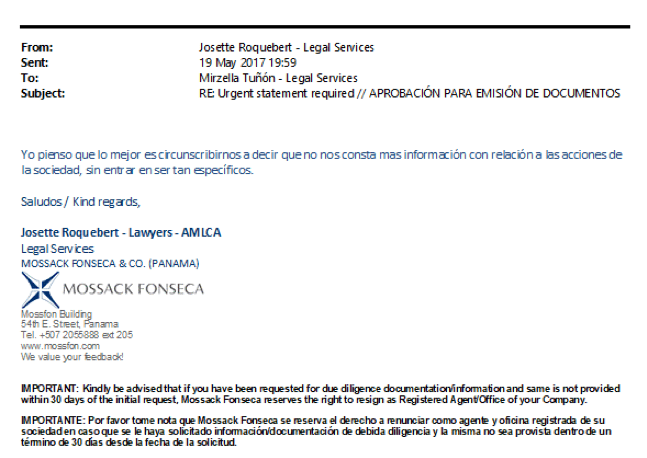
On 24 May 2017, Tuñón wrote to Cini. “Be advised that unfortunately the subscribers are not allowed to directly certify that no declaration of trust has been signed in favour of Ms Michelle Muscat, that’s why we have prepared the below document for your approval, certifying in general that no further documents were signed after 8 July 2013 [the date of the bearer certificate].”
Cini baulked. “I do not understand how the subscribers cannot confirm that they have not signed any additional declaration of trust… The declaration as it is worded …is of no use to me,” he wrote.
Cini added that he needed “an official document that confirms that from the take up of the one share by ATC Administrators Inc in favour of Brian Tonna (as UBO) there was no other share transfer or any other UBO in the company”.
It seems the reference to ATC Administrators Inc reminded MossFon that there was this service being offered too. More fees to squeeze.
“Dear Mr Cini… be advised that on reviewing our records, we noticed that the fees for the provision of ATC Administrators Inc as shareholder of Egrant Inc were never charged, therefore, we will charge you the amount of US$2,000 per year, which [totals] the amount of US$10,000 until 2017”, Tuñón noted.
Cini replied: “I will check my records re your statement on the fees as I believe all have been charged and paid”. He reminded Tuñón that he also asked for a certified copy of the share register.
On 1 June 2017, MossFon sent Cini two “certified copies of the register of members”, one backdated to January of the same year and the other dated June 2017. This pack was sent by DHL the next day with a reminder about their outstanding fees.
Three months later, MossFon sent Cini yet another chaser about bills for their work on Egrant. They received an ‘out of office’ reply. Cini had gone on holiday.
Five years after the Panama Papers, Cini and Tonna were arrested and charged with forgery and money laundering. Egrant’s intended owner remains a mystery.

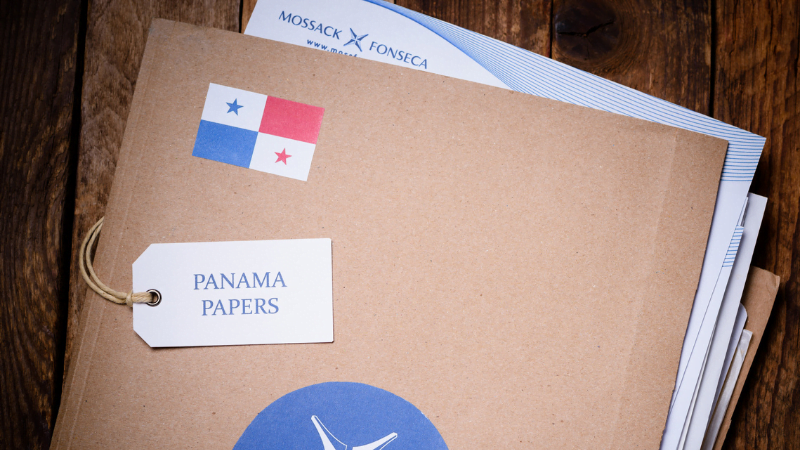













On whose instructions has Dalli provided the red herring? Was it a favour? Was he forced? Was he threatened? Was he returning a favour? . . . He’s got a lot to answer!!!
According to the Egrant Inquiry the 2 shares of Egrant Inc were issued to bearer and the shares were then held Dubro Limited S.A. and Aliator S.A (2 of Mossack Fonseca’s companies) in a fiduciary capacity on behalf of the bearers of the share certificates of the company
What this means is that on paper, the shareholders of Egrant Inc appear to be Dubro Limited S.A. and Aliator S.A, while in actual fact, the real owner/s are any person/s who physically possess the company’a bearer share certificates.
Keeping the above in mind, I believe that any documentary evidence leading to the real ownership of Egrant Inc has been destroyed ages ago.
The point of Mossack Fonseca’s dodgy services was that the owner of a Panama company was whoever you wanted it to be. You just needed to pay a fee.
Xi mkien hemm nuqqas li jikxef min kien jew min kien mahsub li jkun il-UBO.
Insiru nafu mit-tracci tal-flus jew meta Cini jibda jitkellem.
Problema wahda!…..half of the population +36,000 individuals doesn’t give a hoot about these stories!
Most of the half of the population + 36,000 are poisoned by Super One.
Maybe a documentary regarding the super mafia gang will enlighten us better of the past eight corrupt years years lead by no other than the most corrupt pm Malta ever had.